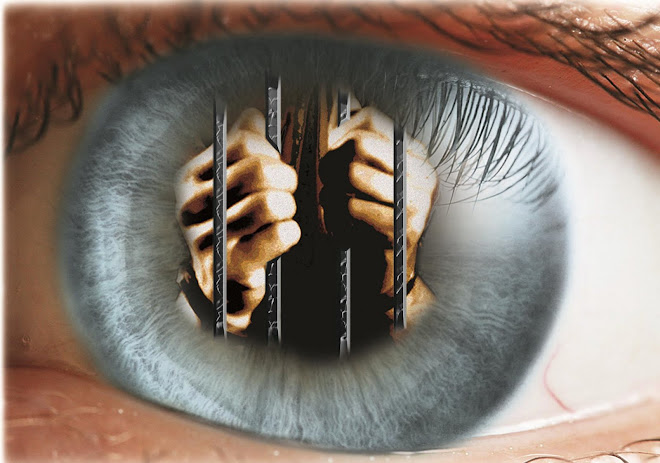The following is an excerpt from Part One:
Smashing sounds of an enormous steel door clamping shut on my heels cause me to shutter. The crash reverberates throughout the expanse of cement and metal. Ten heads turn in unison. Motionless bodies seated along steel benches and propped against gray painted cinderblock walls begin to nudge each other with elbows and knees. I avert my glance to the foot-worn concrete path leading through the jumpsuit-clad brigade. Most are staggered in front of an overhead mounted television. A blaring news report pierces the pressure.
Blood-chilling stares pound at me like a relentless migraine. Twenty feet seems like a marathon. A plastic crate clasped in my arms helps to prevent my nervous spasms from being obvious. At least, I am praying that it does. At long last I reach the base of the steps leading to cell twelve. I start to breathe again. The electronically locked door drones open as I hop up the stairs. I scurry inside the cubicle, collapsing with my load and pulling the door shut nearly in one motion. I do not have the nerve to look back out at the festering mob.
The experience of seeing a prison
The edge of the parking-lot-style yard is enclosed by a double row of tall chain link fencing. The row closer to the building is densely garlanded along the top with Slinky-type attachments the size of hula-hoops. These metallic banana curls with razor like projections repeat in triple fashion ten feet away. The inside of the top, center, and bottom of a parallel outer fence is comparably fortified. I have seen them before from the highway. Now, here they are, up close and personal; so close, and so dreadfully personal.
Scratched onto the filmy surface of the narrow window, much like you might expect to see on the wall of a public toilet stall, are various slogans. “Sully sucks”; “Sully’s inferno”; “Bite my dick, Sully, you bastard.” I turn to face inward, tracking the etched Sully graffiti to the built-in metal desk, which sports several layers of designer prison décor. The base is worn and scraped down to the rusted metal surface. Over that, random blotches of Rustoleum Red bleed through to the next paintbrush-bristle-infused coating of stomach-churning cobalt blue. All of it is finished off with a putrid concoction of leftover paint from throughout the years. It creates an all-encompassing, dirty-underwear effect. Every inch is gouged, to various degrees, with dates and hearts, names, crosses, and messages. “God bless all. Release your hatred.” A litany of sweet Sully sentiments adorn the blasé, butter cream frosting shade of semi-gloss, semi-smut walls.
A similar motif is scrawled around the toilet/sink combo. It spreads to the no-longer-usable, steel wall mirror. The pattern continues, gouged into the industrial strength, steel door. The ceiling is not to be outdone by its surrounding menagerie of muck. Markings are splayed onto the fluorescent light box fixture and scribbled incessantly into its frosted Plexiglas cover. Sully hate scrapple inundates the six-by-ten foot cinderblock cell.




